#Monster Agency Productions
Text
#George Romero#Greg Nicotero#Jimmy Miller's#La Nuit des morts-vivants#making of#Monster Agency Productions#Mosaic production#Night Of The Living Dead#film d'horreur
1 note
·
View note
Text
One of my first (but hopefully not last) contributions to the emerging trivia on Shôgun:
Lady Ochiba / Ruri, the mother of the Taiko's heir Yaechiyo, is based on Lady Yodo/Chacha (1569-1615), niece to Oda Nobunaga and second spouse of Toyotomi Hideyoshi. We see her here as the primary moving force shoring up her son's position and the patron of Toranaga's rival Ishido.

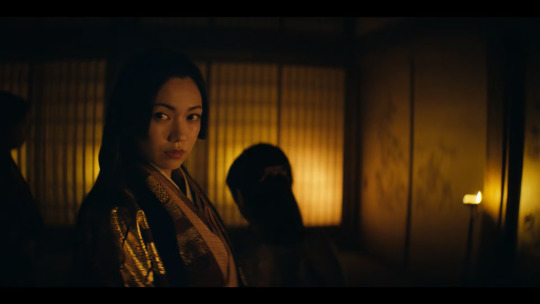
Fumi Nikaido as Lady Ochiba, Shôgun, 2024
What makes the casting of this one very interesting is that Fumi Nikaido has played the actual role of Yodo/Chacha in a similar period production, the 2014 NHK taiga drama Gunshi Kanbei (which was primarily about Kuroda Kanbei, the strategist of Hideyoshi played by Junichi Okada).
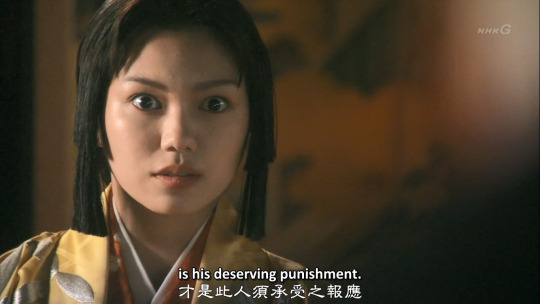

Fumi Nikaido as Yodo, Gunshi Kanbei, 2014
While there's enough hype for Toranaga (especially as he is portrayed by public favorite and producer Hiroyuki Sanada--rightfully so), I wish to highlight Fumi Nikaido's return to this role as it does help highlight the differences between how Lady Yodo is portrayed in fiction. (It does help that we have no shortage of it now--even if it's mostly in videogames like Samurai Warriors, Sengoku Basara or the more historically-faithful Nioh).
The material we have of Lady Ochiba so far is of a proud, haughty, even disrespectful woman--and perhaps it's not exactly far off from how Chacha is portrayed even in Japanese media. To some extent, even Gunshi Kanbei conceded to this especially in the episodes I'm referring with this photo--what with it precisely being the moment Yodo is fearing coming to pass. A mother seeking to protect her son's patrimony (and by extension, her agency and regency), it's a universal trope in feudal drama. What Shôgun does not give her yet (but Gunshi Kanbei took pains to establish) is the recognition that she is as much a victim of the warring era, turning her into a self-loathing monster only able to survive trying to make sense of it all, and maybe recover their agency in it. Clavell rightfully gave it to his main focus character, Lady Mariko (played very layered and well by Anna Sawai compared to her more recent outings--herself based on Hosokawa Gracia).
It truly amazes me that 10 years has yet to make much of a difference for Fumi Nikaido and this role. The woman whose position at the top was only made possible by misery and her playing by the cruel game of chaos, she portrays both versions with the edge, anxiety and palpable will of a woman who's lost everything before and is at the doorstep of losing them again.
#shôgun#shogun#samurai#shogun fx#shôgun fx#shôgun 2024#shogun 2024#fumi nikaido#chacha#lady yodo#yodo-dono#ochiba no kata#james clavell#lady ochiba
100 notes
·
View notes
Text
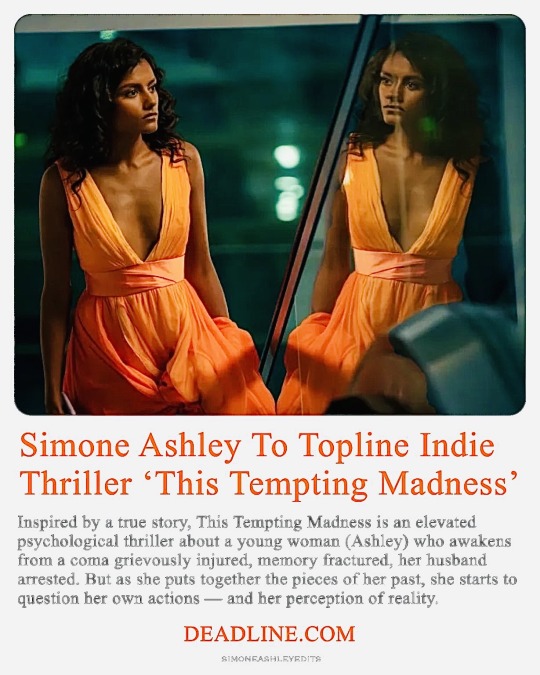
EXCLUSIVE: After breaking out with her lead role in the second season of Netflix’s smash hit series Bridgerton, Simone Ashley has moved on to star in This Tempting Madness, a new indie directed by Jennifer E. Montgomery, from her script written with husband Andrew M. Davis, which just wrapped production in Los Angeles.
A first look still from the pic, marking Montgomery’s feature directorial debut, can be found below.
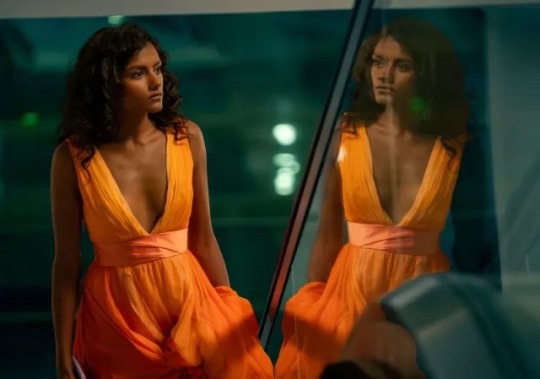
Inspired by a true story, This Tempting Madness is an elevated psychological thriller about a young woman (Ashley) who awakens from a coma grievously injured, memory fractured, her husband arrested. But as she puts together the pieces of her past, she starts to question her own actions — and her perception of reality.
Producers include Montgomery and Davis for their Smoke Jumper Films; Mango Monster Productions; Jessica Malanaphy and Marcei Brown for CatchLight Studios; and William Day Frank. Coming from a background as a cinematographer, Davis will also be lensing the film.
In the second season of Bridgerton, based on the hugely popular Julia Quinn romance novels, Ashley was introduced as Kate Sharma, who’s courted by Viscount Anthony Bridgerton (Jonathan Bailey) upon her arrival in London from India. For a moment snatching the record of the most-watched English-language series in Netflix history, with 251.7M hours viewed in its first seven days, the season was celebrated for breaking a race barrier with Ashley’s character, whose ethnicity was changed from the books so that her family would be of Indian descent.
Set to reprise the role in Season 3, Ashley has also recently appeared in Disney’s live-action reimagining of The Little Mermaid, as Ariel’s sister, Indira. Otherwise best known for her role as Olivia on Netflix’s BAFTA-winning series Sex Education, she also boasts credits including Pokémon Detective Pikachu (Warner Bros), Broadchurch (BBC America) and C.B. Strike (Cinemax), to name a few. The actress is represented by Identity Agency Group, CAA, and Myman Greenspan Fox.
Montgomery and Davis are repped by Anonymous Content.
Source: Deadline
#simone ashley#bridgerton#kate sharma#dailywoc#southasiansource#wocdaily#ladiesofcinema#wonderfulwomendaily#wonderfulwoc#femalestunning#wifesource#dailybridgerton#dailyfemale#femaledaily#dailykanthony#dailypoc#this tempting madness
134 notes
·
View notes
Note
Hey Mike! First off, it makes me so happy to see you out there fighting with your writer friends to ensure they receive a decent living wage for the amazing work that they do.
As for my question, I would love to hear about some of the inspiration for making Before I Wake. It and Absentia were the last two of your films that I watched, and BIW just absolutely destroyed me. No other movie, including and especially a horror flick, has ever made me bawl like a baby like that. The entire tone of the film is so spot-on, and the climax of the nightmare monster “dissolving” from its evil form after being embraced…. To me that scene just perfectly encapsulates what it’s like to be a parent, and human; sometimes we just need someone to hold us and let us know things will be all right. We spend so much of our time making sure that our children feel loved and cared for, that sometimes we forget about ourselves. And you just fucking nailed it, my dude.
Like I said, I would LOVE to read any backstory or inspiration that you have for this film! It’s so beautiful and underrated.
On the WGA front, don't be too impressed with me - I mean, I'm a professional writer, I've been a member of the WGA since Absentia, so I'm out there fighting for myself as much as everyone else.
But on the Before I Wake front, you know I very rarely get asked to talk about this one, so I'm happy to... fair warning for another long post!
Before I Wake was originally titled Somnia, which is latin for "dreams." It was part of an unofficial trilogy of sorts, comprised of Absentia, Oculus and Somnia. All three of those movies were meant to work together as a thematic triptych.
Ultimately, Before I Wake was brutally sabotaged by its own studio, who drastically undermined it creatively and then destroyed any hope of a meaningful release. It remains a particularly heartbreaking chapter of my career... but a film I have and will always have tremendous affection for.
A lot of people think that Somnia was made after Hush and Ouija: Origin of Evil, just before Gerald's Game, but this is entirely incorrect. It was actually the second "real" movie I ever made, and was actually shot before Oculus was even released.
The basic premise of Somnia focused around a little boy whose dreams manifested physically in the world around him, and was an original concept I carried around for a few years before Oculus got picked up by Intrepid Pictures. In fact, I've talked about my first meeting at Intrepid, where I pitched a few ideas that were rejected... Somnia was the first one I pitched. Trevor Macy opted to pursue Oculus that day, but he ended up producing Somnia right after.
This unofficial "latin trilogy" seemed to fit together well. Absentia was a somber and bleak look at the loss of hope, Oculus was more thrilling dive into the labyrinth of past trauma, and Somnia was meant to take that loss and trauma and end the triptych on a note of hope and healing.
In fact, the script for Somnia was written before Oculus was greenlit. On the page, it was my favorite of the three. I was very taken with the story of little Cody and his personal boogeyman, and of the revelation at the end of the story... that with understanding, even the most monstrous of our fears can lose their destructive power.
Cody's birth mother had died of cancer, and he had seen her just before her death. That final image of her, as well as a misunderstanding about the pronunciation of the word "cancer" had led to the creation of a monster in his mind, who he called the "Canker Man"... a gaunt figure who took away people that he loved. When he finally learns the truth about his monster, and about his mother, he begins to understand it all... and the monster loses its awful powers as empathy and understanding take root.
While Absentia finished its festival rounds and Oculus inched its way toward production, Somnia was my first script taken out to market by my new agency. I had signed with APA just as Intrepid engaged me on Oculus, which was my first studio writing and directing job. Jeff Howard and I finished our first draft of Oculus and turned it in to Intrepid, and immediately turned around and started writing Somnia.
The script got some interesting attention. While some of the more mainstream horror companies balked at the emotional ending and preferred a story that was "more about a boy and his monster" than the emotional wrap-up we insisted on, others understood it right away.
Elijah Wood and his producing partner Daniel Noah sought me out when they read the script. We met for drinks in Venice and I was absolutely starstruck, and we've remained friends ever since.
Jada Pinkett Smith was another big fan of the script, which led to a surreal afternoon at her stunning home where we talked about the story at length and watched an early cut of Oculus in her home theater. Will Smith joined us toward the end of the meeting, and I had a difficult time speaking.
I've written before about the drama surrounding Oculus' premiere and eventual sale to Relativity Media, so I won't rehash that now, but as Oculus raced toward release, Trevor Macy at Intrepid made an offer to produce Somnia for Relativity and I eagerly accepted. My first "real" movie was going to be released wide in theaters, and the same studio was going to double-down on me - Somnia was greenlit by Relativity for a big domestic theatrical release. We'd pre-sell our foreign territories on this promise, and they eagerly snatched the movie up. This was my own Hollywood dream, coming to life.
It wouldn't work out that way. In fact, Somnia would turn out to be the first nightmare of my career.
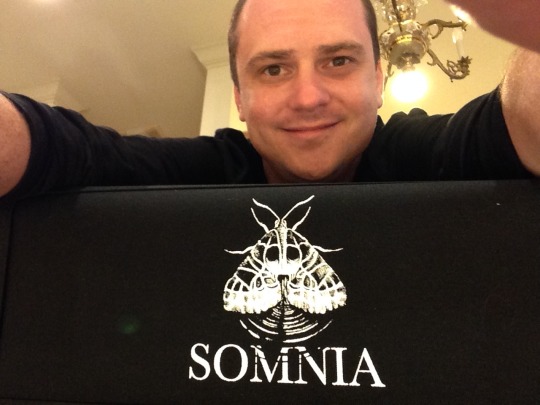
It started well enough. We had filmed Oculus in Daphne, Alabama, taking advantage of an aggressive tax rebate. We would do the same with Somnia, bringing back a lot of my Oculus crew and shooting in and around Fairhope. We began shooting in the fall of 2013, less than a year after we'd wrapped Oculus.
We hit the ground running. Very little time had passed since we wrapped Oculus, and the movie hadn't come out yet, so at first it felt a lot like we were just picking up where we left off.
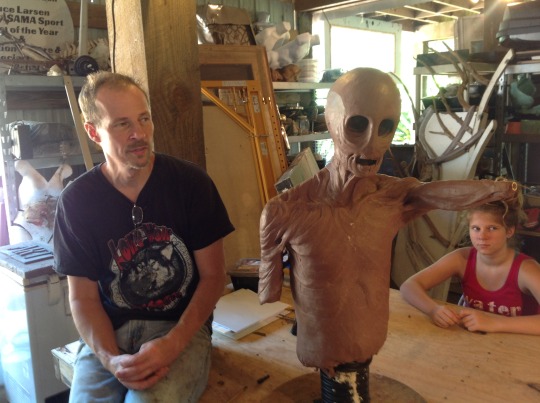
Bruce Larsen, who also carved the Oculus mirror, working on a prototype of the Canker Man.
We had casting challenges. I was still a relatively unproven director, my first studio film hadn't been released, and this was an ambitious script. After a lengthy search (driven by foreign pre-sales, a process I knew nothing about and now quite detest), Kate Bosworth signed on to play Jessie, and Thomas Jane - who I admired greatly from his recent work in The Mist - joined the production as Mark. (Funny story - Tom arrived with hair down his shoulders, and vehemently didn't want to cut it. That disagreement put us off on an awkward foot, and I ultimately conceded the point to him... though I do regret that now.)
The major discovery was 7 year-old Jacob Tremblay as Cody. Jake had only made one movie before this, he had a small role in The Smurfs 2. His self-tape audition came out of nowhere and we knew was a a phenomenal talent. Right after we wrapped, I got a call that he was being considered for a movie called Room, and we shared some footage to help him get the part (that movie would establish him as one of the biggest and most sought after child actors in the world... but we had him first.)
We were committed to practical effects wherever possible, and creating a striking suit for our monster. It all felt like it was going to work. But the shoot would prove to be much more challenging than we anticipated.
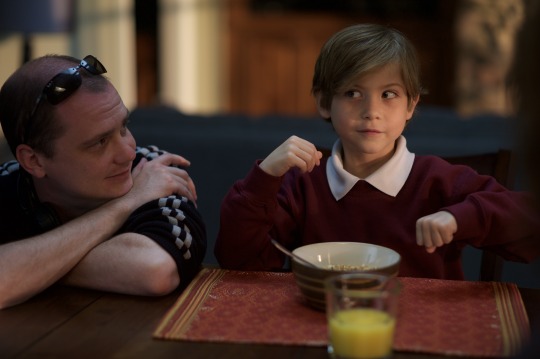
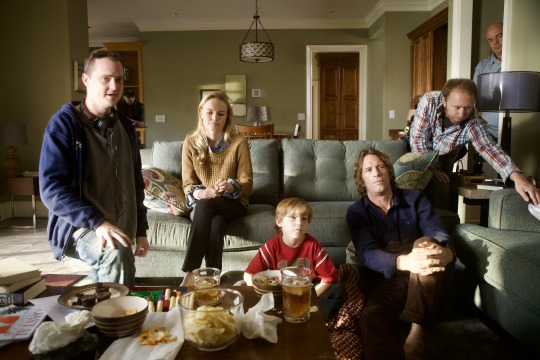
The shoot itself was challenging for the typical reasons. There was a little creative tension on set with particular actors, we didn't have enough money to pull off our more ambitious visual moments, and we were forced to remove several production days at the last minute, throwing our schedule into a bit of chaos.
But none of these issues were particularly unusual for a lower budget film, and while it was more challenging and frustrating than Oculus had been, overall the shoot was just fine. I felt that our third act was pretty drastically under budgeted, and what was scripted to be a deep dive into a child's imagination was stripped down to a few vines on the walls and some moths... but other than that, I don't really have much to complain about.
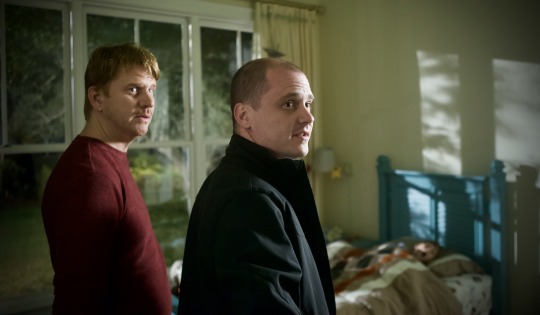
(Fun fact: it was also the first time I would work with Annabeth Gish. We were fast friends, and though she was only with us for a few days, I knew we'd end up working together again.)
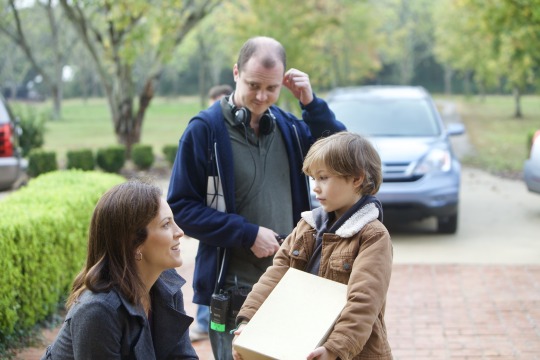
We wrapped the movie, I got to editing, and all seemed fine. It was a unique story, much less horror-centric and much more of a fairy-tale. This was, of course, by design. There was a delicate vibe to the whole thing, anchored on Jacob's arresting performance, and a shadowy magic. It felt innocent, wondrous, and ultimately cathartic.
Then, Relativity got their first look at the cut, and the problems started in earnest.
We had been clear (and aligned, I'd thought) about what kind of movie this was. But almost immediately, despite these conversations, the studio began to push the film more and more toward being a traditional horror movie.
We had designed a practical monster in the Canker Man. Our creature was tactile, practical, and - we believed - appropriately simple. After all, it was meant to have come from the mind of a child.
The studio kicked hard, and the directive came down to try to make the monster "much scarier."
There wasn't a lot we could do; we'd shot what we'd shot, after all. The decision was made to take our footage of our practical monster and drastically alter it using visual effects.
The Canker Man would be digitally warped and molded into a skeletal, grinning creature. The visual effects artists would be using footage that wasn't captured with the intention of being altered that way, so a lot of the artifice would be obvious. He'd become a little rough around the edges. We told ourselves that this would be okay... it was a dream, after all.
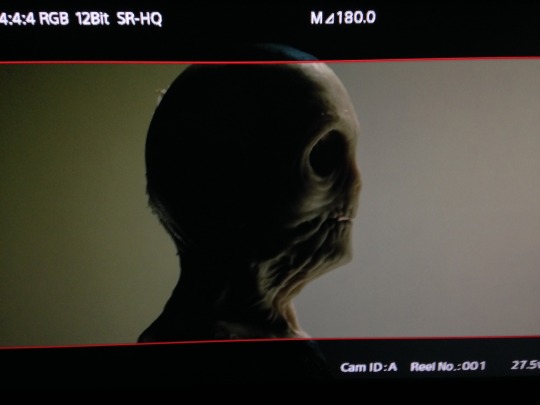
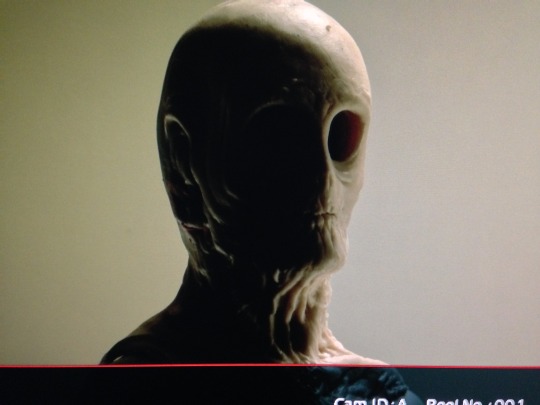
Early camera tests of our practical Canker Man suit

The final VFX-enhanced monster
This began to nudge our monster away from our core concept. While our practical suit would always need some help from VFX, this was now tilting into an area that strayed from the true identity of the creature.
Another major sticking point was the plot itself.
In the movie, Cody's adopted mother Jessie is shocked to find a physical manifestation of her deceased son, Sean, after Cody sees his picture. She then goes about trying to "rebuild" her dead son in the imagination of her new foster child, hoping to see and interact with him more... "I just want to hear his voice."
This morally questionable exploitation of Cody was, to put it mildly, the entire point of the story. Jessie goes too far, and when she finally resorts to drugging Cody to force him to sleep in the hopes of seeing her lost son, he is unable to wake up from a nightmare and her husband is killed.
Jessie spends the rest of the film clawing her way back to redemption, and having to atone for what she's done, all while finally focusing on Cody's past and healing instead of her own.
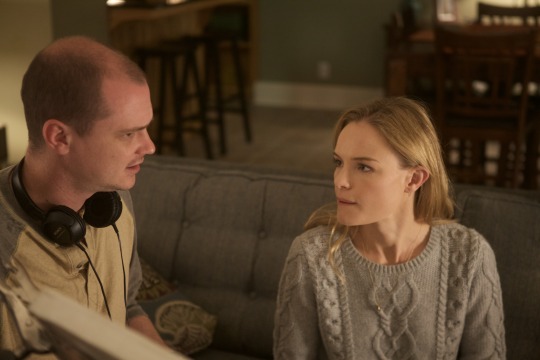
As a character, Jessie does things we do not agree with, and they have serious, permanent consequences. And the moral murkiness of this was, frankly, the point.
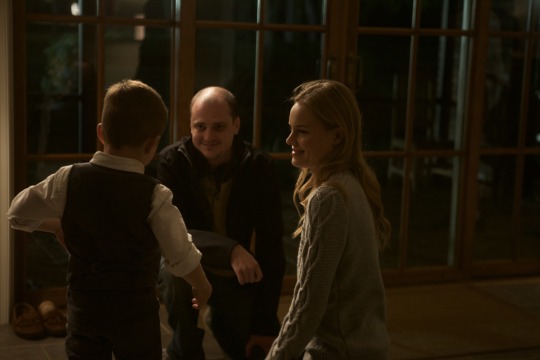
The studio was flinching hard. "It makes her unlikeable," they argued. There was a push to try to back off of this, and to pull the punch... sure, she could exploit him somewhat, but they wanted to pull it back. Kate Bosworth's performance began to be altered in the cutting room, flinching away from some of the more decisive choices in favor of a more watered-down, morally generic heroine.
This middle ground would prove to be ill-advised.
As we were battling over the edit, something else happened. Oculus was released in theaters in April 2014.
If the movie was a huge hit, it would mean I would likely win more of these arguments, and Somnia would be restored to something closer to my vision. If the movie bombed, the studio could (and likely would) run ramshot over Somnia, twisting it into a more generic studio horror story and jettisoning things they didn't quite understand.
Ultimately, the movie performed... moderately. It was kind of right in the middle. It wasn't a failure, but it wasn't a hit either. Both sides dug in. And suddenly, Somnia was being twisted into something between two tones.
Citing the "disappointing" performance of Oculus (which, frankly, did just fine), the studio insisted that we write and shoot some additional "scares". Among them was one of the worst studio notes I'd ever receive (well, at least until I started working for Netflix.)
The entire premise of the film was that, when Cody slept, his dreams would manifest physically. When he woke up, they would vanish. This was, to put it bluntly, our only rule.
The note came in: "We need a scare set piece to occur when he is awake."
Now, I can't understate how nonsensical this is. It defied the entire premise of the movie. Their rationale (such as it was) was that the audience wouldn't ever be frightened when Cody was awake, because they knew the monsters only came when he was asleep.
"Well yeah," I said. "That's why it's important that the movie isn't just about scares."
But they were insistent. If a monster showed up while Cody was awake, that would be "truly thrilling" and "catch the audience off-guard."
It was the equivalent of saying "the shark in Jaws only attacks people if they're in the water. We need an attack to occur on land." I mean, that would really catch the audience off-guard.
I had no idea how to address this note.
It was early in my career, I didn't have a theatrical hit under my belt, and I didn't have the ammunition to fight it. So I had to address it somehow, and it had to satisfy the studio, or else we may not get our theatrical release after all.
So I ended up writing a scene where Cody is wide awake, only to be attacked in his bed by the specter of a deceased bully (a previous victim of one of his dreams).
How the fuck were we going to make this make any sense? Well, we had to write a whole other scene - much earlier in the film - where a therapist explains the concept of "waking dreams." Jay Karnes (who was a lovely person and one hell of a good sport) had to randomly say "you know, some people can dream while they're awake" to Bosworth, desperately trying to set up this moment.
It doesn't quite work, to say the least. Cody looks under his bed, sits up, and is attacked by this eye-less specter. Then, he's dragged screaming under his bed, until the attack just... stops, for some reason.
We filmed it, and I thought it was the stupidest thing I'd ever shot (it wasn't, though - the stupidest thing I've ever shot remains the on-screen stalking and murder of a cat in the pilot of Midnight Mass, a truly braindead scene that Netflix insisted on adding.)
Along with this scene, which would become the crux of Relativity's trailer, we shot several other random scares that were peppered throughout the movie. Now, this wasn't enough to tip the film entirely into being a horror film... just enough to make it exist awkwardly in between two genres.
It got worse. The addition of all this new "horror" material made the film longer (go figure), so the directive came down to begin removing other elements to make room. Those elements were character development and context.
The cut began to get bumpy. The fairy-tale tone of most of our original footage was at odds with the overt horror tone the studio was insisting upon. Every time we tested one of these cuts, the audience was understandably confused... they really loved the concept, they really loved Jacob, and they all loved the ending revelation - but along the way, what was this movie? Was it a horror film? Was it a drama? A fantasy?
Even with this, our test screenings were actually pretty good. We were testing in the high sixties and seventies - which is, infuriatingly, right in that middle zone: not good enough to kill the studio interference, but not bad enough to let them take over.
So we kept fighting. And we kept cutting. And we kept testing. And with each screening, the studio forced it further and further into this no-man's land.
There were a few victories, though. Danny Elfman came on board to collaborate with the Newton Brothers on our score. Some of our non-horror sequences, like a scene involving Christmas-light butterflies, were being called out by our test audiences in the best ways. But the tug-of-war over the basic identity of the film was tipping decidedly toward the more horror-centric approach.
Finally, the studio came after the title. Somnia was too confusing, they said. Nobody knew what it meant. So, we added a scene where Jay Karnes - once again having to naturally sell force-fed exposition - literally defines the world "somnia" during a therapy scene (these therapy scenes were basically being used to spoon-feed material to the audience.)
That wasn't enough, though. The studio began workshopping other titles, and they landed on perhaps my most hated of all of the options: the ultra-generic Before I Wake, a title already used by a handful of low-budget thrillers over decades. We conceded after it was made clear that it wasn't really up to me in this case, and we limped into what I consider to be the worst title of my career.
With our new uneven tone, a new and "improved" monster, and a groan inducing title, they finally agreed to stop messing with the movie and honor their commitment to releasing it wide.
You tell yourself a lot of things in this business, and I told myself that the heart of the story - the revelation about where the concept of the Canker Man came from - was still intact, so all would be well. Viewers would be able to look past some of the bumps because the payoff was worth it.
But we didn't know what else was happening at Relativity.
They announced the release date for the film, posters started showing up in theaters, and we were anxiously awaiting our big wide theatrical release... when suddenly everything stopped.
We didn't know it yet, but Relativity Media was having huge financial problems. They were on the verge of bankruptcy, as a matter of fact, and though they weren't admitting it yet, internally they were in a state of absolute chaos.
Without warning or explanation, the studio moved us off our date. The movie wouldn't be released after all. We immediately knew something was very wrong, despite Ryan Kavanaugh's insistence that our date was "just a bad date," and that he'd moved the movie in order to make it "an even bigger success." No, this whole thing stunk. It stunk bad.
They set another date, and we watched and waited. But no trailers. No marketing. And then... that date was pushed as well. Again, they insisted everything was fine. But we knew. Something was deeply wrong with the company, and they were lying to us.
Some of this played out publicly. Kavanaugh and I got into a spat on Twitter when I suggested that the studio wasn't able to release the movie theatrically after all (I still don't regret saying this, and man oh man, was I proven right).
Meanwhile, our international distributors were scrambling. We'd sold a lot of international territories off the promise of our big theatrical release in North America, and they weren't going to wait forever. By the third time Relativity pushed our release date, the whole house of cards fell down, and various international territories started releasing the film haphazardly on whatever platforms they could.
There was no coordinated release strategy. Suddenly, the film was just available in Argentina, for example. Or it was On Demand in Russia. I remember being shocked when a German Blu-ray appeared on eBay without warning.
There was no rollout to critics, no coordination at all. Within a few weeks, it was pirated and available on torrent sites everywhere. And without a proper press rollout, the only reviews available were trickling in from these international markets, or random blogs in other countries. A slew of reviews - many of which were from obscure blogs in Russia and Turkey, not even written in English - hit Rotten Tomatoes. With no counterpoint from any credible critics, we debuted with a 30% rotten rating.
It would stay this way for years.
Relativity finally admitted the truth, declared bankruptcy, and went to court. Our movie was dragged down into the vortex with it. Our abysmal tomatometer score suggested that the movie wasn't released because it was bad, not because the studio had gone bankrupt. This assumption stuck to us like glue as the film languished in bankruptcy court.
Heartbroken, we turned our attention elsewhere. I would write and direct both Hush and Ouija: Origin of Evil before the whole distribution saga of Before I Wake was finally resolved.
In the years that followed, very little would be said about Before I Wake, and whatever was said was absolutely not positive... how bad must this movie be, after all, to be so unceremoniously pulled from the release? Some theaters just left the poster up, still saying "Coming Soon." I know of one theater in LA that had it up for over a year.
By the time Relativity finally settled their mess, and the film was unceremoniously given back to us with the most lackluster apology imaginable, and our chances of a domestic theatrical distribution were entirely obliterated. The film was already available online through piracy and a tiny handful of foreign blogs had defined our critical reception. No other studio would touch it.
We were able to arrange one screening of the film once it was unencumbered... we had a single showing at Fantastia in Montreal, a festival I adore. Instead of a huge worldwide theatrical release, the movie would play exactly one time, to one audience.
It was sold out, it played wonderfully, and it remains one of my favorite screenings of my career.
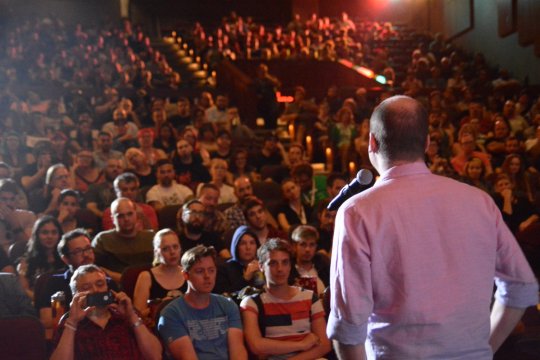
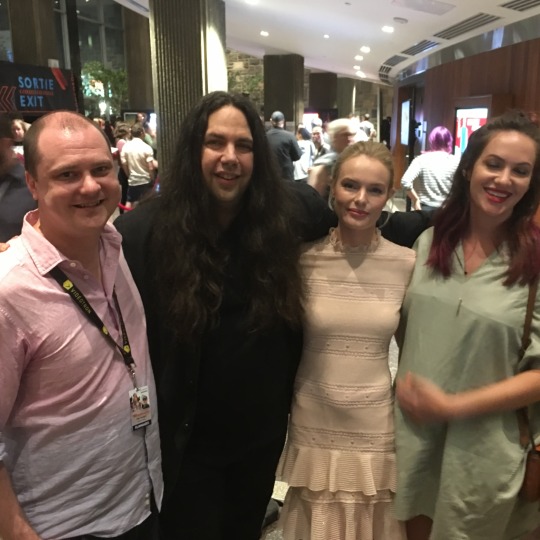
With Mitch Davis, Fantasia's artistic director, Kate Bosworth, and my wife Kate Siegel.
In the years that had passed since we shot Before I Wake, Kate Siegel and I had gotten married. At the premiere, and in the picture above, Kate was pregnant with our son.
We named him Cody, after the little boy in Somnia... the little boy whose dreams came true.
In 2016, Netflix acquired the North American rights to Before I Wake, and quietly dumped it on the service. There was no premiere, no rollout, no screeners sent to critics. One day it just appeared on the service without fanfare, as Netflix does to so many titles.
It didn't even appear on the New Releases tab.
A few critics found the movie on their own, and slowly some new reviews started to trickle out. Bloody Disgusting led the charge, discussing how the film had been wrongfully maligned over the years, and correcting identified it as a "haunted fairy tale" that was being handicapped by the expectations that it was a horror film.
Our tomatometer began to slowly rise. After some time, it tipped out of "rotten" into "fresh"... and today stands comfortably at 66%. Those early, malicious reviews are still there, the movie is still scarred by them... but despite Relativity (and eventually Netflix's) efforts to rebrand the movie as a straight horror film, most critics were able to see it for what it truly was.
Our audience was as well, for the most part. Some viewers yawning their way through the Netflix original horror feature section would find it, and get something maybe just a little more thoughtful than they were expecting. A few people reached out to me to talk about losing their own loved ones to cancer, or about how the sweeter elements of the story impacted them. I've always been grateful for that.
But ultimately, the movie was just brutalized by its studio. I've never again had so much damage inflicted on a project by a creative partner and supposed collaborator. And while Netflix did the bare minimum when it came to releasing the movie, I am still very grateful that that they even did that much... if it wasn't for Netflix picking it up, I think there's every chance Before I Wake would have never been made available at all.
I'm proud of the movie. It's not perfect, by any means - it was an ambitious sophomore effort and I had a lot to learn about a lot of things - but it has some beautiful ideas and some moments that really work. I see its flaws clearly, too, and while I tell myself some were out of my control (like the awkward scares forced on us by Relativity), others were most certainly entirely on me. Not everything works, and that's okay.
But man, Jacob Tremblay is phenomenal in this movie. And I absolutely adore the final ten minutes.
My son Cody is almost 7 now, exactly as old as Jacob was when he was cast to play his namesake. I hope Cody's dreams come true; that's why we named him what we named him.
Sometimes, our dreams don't come true quite how we might expect.
Hollywood is just kinda like that, I guess.
237 notes
·
View notes
Text
IPC analysis+Penacony Adventure Mission Spoilers ahead read at behest
I just did the Chadwick Adventure Mission and I’m so. Just horrified. When you’re trying to resist and say no no I won’t do this and they shoot you? And then the countdown as the screen gets more and more fuzzy and Dudley is talking and as you watch 24 planets that the IPC see as a good enough collateral for their means are obliterated he’s just standing there and going “Hey at least you’ll have a legacy. The rest of us? We won’t even be remembered” because in an organization as big as the IPC being remembered as a monster is better than being forgotten at all.
There is no identity in the IPC. Everyone is a pretty stone that is only worth something when polished and worn like an accessory. Sure the rarer ones are hard to come by but they’re still able to be replaced with a bigger, prettier version. Aventurine and Topaz, how quick they were to jump to the morally dubious answer. How quick Dudley was to jump to leaving 24 planets unremembered and sneering at the idea that he himself will also be left as such.
Aventurine has a serial number because he’s a product to the IPC. Without his identifying stone he’s just the IPC’s spare body. He’s a gambler because all he can do is gamble, it’s the only way he can gain agency and power. It’s so hard to not like him because everyone else doesn’t like him for a very different reason and are being derogatory to him. Like god no wonder he places no value in friendship as far as he’s concerned he’s completely on his own. I don’t like him that much, make no mistake, but I do like him more than Topaz because at least he doesn’t seem to have a choice in serving the IPC while Topaz does. Rewatching her trailer and seeing her bask in the roars of a crowd chanting “Interastral Peace!” in an almost religious way it’s horrifying. Adding to that, Dr Ratio is involved with the IPC and he’s literally based on Rome and if you know anything about the history of Rome that feels intentional.
Not to mention Penacony used to be a prison planet of the IPC and now we know they were using the planet to try and pry out the knowledge of a weapon of mass destruction by stripping away his body and memories and leaving him to wander aimlessly in a pretty dream until they can harvest husk of a consciousness to hurt more people?
They were so ready to steamroll over Aurum Alley at any costs knowing the ramifications it’d have on the people of the Luofu. They were ready to reclaim Jarilo-VI and try to “revive” it knowing the failure rate was higher and they could very easily leave the place a husk. It’s honestly hilarious that they claim to serve Qlipoth because they never actually protect anything, they destroy. Every time the IPC is involved with something the people they’re against are the ones protecting, Sushang protecting Aurum Alley, Bronya protecting Jarilo-VI, Chadwick protecting anyone who could be a victim of his hubris by passing his knowledge to Herta to make a counter against it, the Genius Society protecting their work from being misused by refusing to collaborate with the IPC… it’s never been the IPC who protect.
In case you can’t tell I really hate the IPC and I typically like antagonistic/villainous characters/entities but there’s just something about the IPC that gives me rancid vibes.
64 notes
·
View notes
Text
Endeavor - Intro/Headcanons
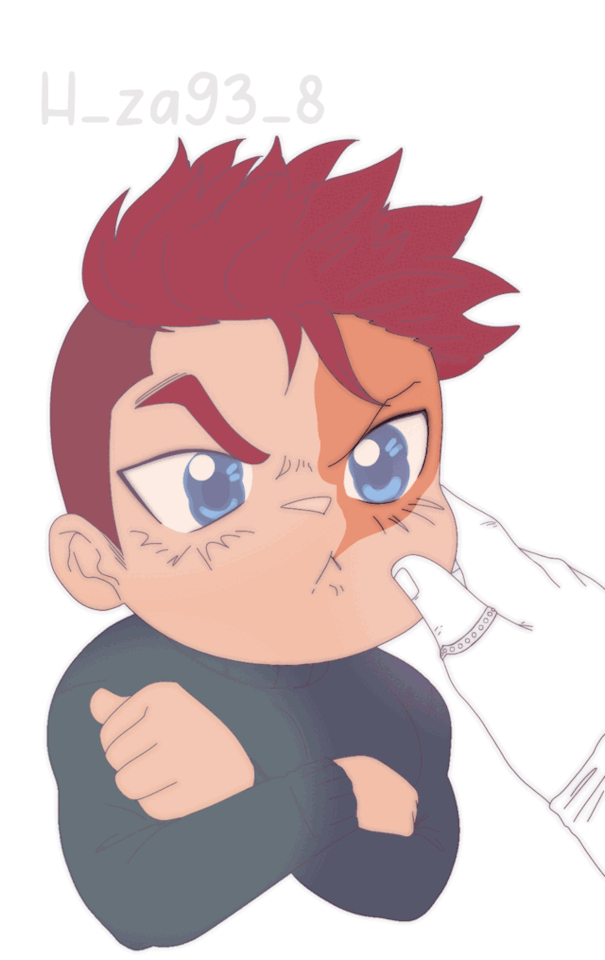
Endeavor is a very underrated character.
yes he was an abuser, but he is trying to be a better father. and even though hen still gets mad and doesn't really know how to show his emotions he's still trying. As someone who doesn't have the best relationship with her father, and also as some one who is trying to be a better person I can appreciate that.
I feel like if somebody were to give him a chance, somebody that has little to no knowledge of his past or status he could actually have a stable and healthy relationship with such a person.
but that on it's own is boring so make it a reader who was just recently put in an orphanage as she was saved from her neglectful parents and has no other family. we'll keep her around the age of 4-15 as those were the years that endeavor missed the most with his kids.
now, how would these two meet? I have a couple ideas and I'll write a fanfic (or fanfics) for the most popular one. (there's a poll below for y'all to decide.)
option 1 : Bus stop
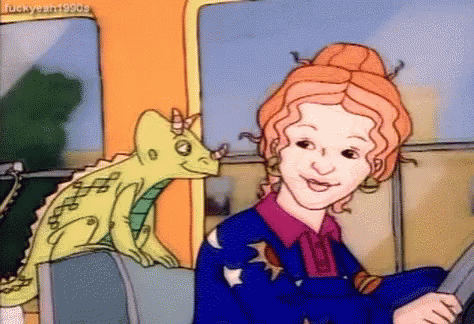
reader is around 5,6,7 years old and quirkless.
so you and Endeavor have a similar morning commute at the same bus stop, at the same time, every morning. you go to school, and him to his agency. and while Endeavor never really cared for this, one morning you happen to forget your coat at the orphanage. (not that it kept you warm anyway.) the sight of a child in winter, cold and alone, practically pulled at his heart strings. a feeling overcame him I suppose, a need to protect and provide perhaps. and begrudgingly he got out a sweater, all warm and fluffy and lent it to you, grumbling something about giving it back to him later. now all snuggled up within the oversized cotton fibers of the sweater, warm and happy, all you could really do is mumble out a little thank you. Imma bout' to pull a grinch but Endeavor's heart grew 3 times that day.
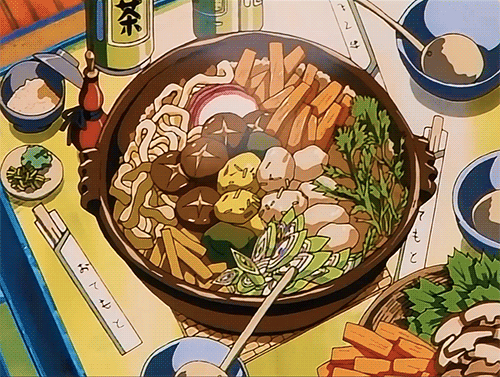
Option 2 : support hero
reader is 15 and quirkless but uses support items to help her if she needs anything.
you are the apprentice of his main support hero, a wild, spunky woman who spends her days drinking, drunk, or hungover. ( I mean... good for her.) and yes while she does teach you, she usaully leaves all the real work to you. at this point she's your apprentice. so when Endeavor comes it's not her that really helps it's you! you repair, you improve, you operate the rest of the support heroes, honestly he should give you a raise. and it's nice, having you around I mean, you just always seem to make his day better, either by showing him cat memes, or explaining your latest obsession to him, or just being your self. it's a talkative and optimistic x furious monster that will fight to the death for them dynamic or a brings instant noodles to share for lunch x uses his fire quirk to actually cook the instant noodles with his fire quirk dynamic.

Option 3 : Dabi
more of a Endeavor-Dabi mix for the drama. reader is 4 and gets her quirk in the story. her quirk is a heightened version of shoto's quirk which I'll expand on if this is the fan favorite.
you are the product of Dabi and a fling he had when he was 19 or 20, and while he may not have the most money or have the money, he still tires to protect you and and make you feel as cherished and loved as one can. growing up he never really showed you what a hero was. all you need to know is that they are not good people but don't tell anyone that lots of people don't know that and might get angry. now this is fine and all, Dabi protects your innocence while also protecting you from the world that hurt him. but one thing he negelcted to teach you is who is a hero. because the description he gave you "people attempting to 'save' people and fight 'bad guys' using their quirks often with swarms of people around them." only applies to heros in action and/or heros that the public actually like. so when Endeavor is placed to patrol in a relatively bad neighbourhood (it's the best one dabi could afford HE"S TRYING C"MON) around the time kids go and comeback from school to make sure they get home safe is when he meets you. a little girl with white hair like snow and sapphire blue eyes that glisten with joy.
POLLS!!!
thx for reading!!! byyeee.
#yandere enji todoroki#yandere endeavor#yandere bnha#bnha headcanonc#yandere mha#bnha imagines#enji todoroki#enji x reader#enji todoroki x reader#endeavor fluff#bnha endeavor#mha endeavor#mha enji#dad dabi#mha poll#bnha poll#my polls#tumblr polls#i have polls now#bnha x reader#bnha#bnha headcannons#bnha fluff#bnha x child reader#platonic yandere#child reader#bnha dads#i finally have polls#polls#poll time
59 notes
·
View notes
Text
Kill la kill: What is Ryuko and Senketsu's friendship anyway
I talked before about how Life Fibers are representations of fate and predominantly facist ideals, which is why the show ultimately isn't about and doesn't end with interspecies friendship. Senketsu then is a representation of Ryuko's fate, and in the end, he frees Ryuko of himself.
BUT, Ryuko and Senketsu's relationship is more complicated than "fate imposed on a person"...... yet at the same time that's exactly what it is. Their friendship is real and fraught with ups and downs, and they BOTH undergo arcs catalyzed by the other.
Ryuko is a product of destiny grappling with her own agency. She takes up the scissor blade in order to avenge her dad, but was forced to confront her fate--Senketsu, who was tailor-made specifically for Ryuko, and who very literally and uncomfortably forced himself on Ryuko.
...Not a great start tbh. Just as Junketsu is Satsuki's wedding dress, Senketsu is Ryuko's. At that point, the only reason Ryuko rolled with Senketsu was because she could then leverage Senketsu's powers to defeat Satsuki.
(Side note, Satsuki forces Junketsu to bend to her will, but like her conquest, playing to best the system is still playing within the system. Both girls were both going to be fed to their predetermined fates one way or another. But anyway)
Ryuko has a complicated relationship with her destiny and with herself, all of which is reflected in her friendship with Senketsu. She was forced into a role, became a pawn in a game set by her parents and those around her, and yet somehow learned self love and agency. Her relationship with Senketsu is a reflection of her own self-image: when she's comfortable in her own skin, she and Senketsu are in harmony. When she is disgusted by the truth of being a Life Fiber human hybrid, she sees herself in what Senketsu is, and is vehemently repulsed.
Like Ryuko, Senketsu is a hybrid of Life Fibers, Ryuko's human DNA and his own personality. As much as Ryuko is a product with predetermined destinies, so is Senketsu, more obviously even.
Senketsu is weaponized clothing. In a world where everyone wanted to possess or destroy him, Ryuko calls him her friend.
Ryuko is a manufactured hybrid soldier. In a world where everyone wanted to use her or put her down, Senketsu calls her his friend. (We'll get to Mako in a bit)
Senketsu and Ryuko both embody their own struggles against fate and self-image. How can you live and accept yourself, when you were created a monster? A tool to be used and otherwise euthanized? Products made to either save or destroy your own species?
"Everyone else can take off their clothes, but I can't take off my own skin."
Although Senketsu's struggles aren't as upfront as Ryuko's, we still see him grapple with how Ryuko perceives him: as a friend, as "just a piece of clothing," as a mirror held up to herself? And what then, when the answer is "yes?"
The simple and most difficult answer, that I believe was presented to us, is to accept yourself and to choose what path to walk.... which is essentially the very thing that our facist villain Ragyo wants to eliminate.
At her lowest point, Ryuko was faced with the reality that she is in fact the weapon that everyone treated her as. Her fears are realized. How can anyone love this? How can she? Mako shows her that there are those who love her unconditionally--Mako herself in fact! It's important that Ryuko realizes this. But this alone isn't enough to save Ryuko from self-loathing.
The Wedding is a scene where we can clearly see the difference between giving into a predestined fate, and accepting yourself. It's here that Ryuko finally realizes that she does have the power to choose, and that for everything she is, she is unconditionally worthy of love from others and herself.
Senketsu would also make this realization, but from his side of the coin. He is clothing, to be worn, to be grown out of. He is also a weapon destined to consume his wearer. He is horrified by the idea that Ryuko is supposed to be his food, and yet would force himself onto her at the beginning. Even at the time of the Wedding, Senketsu declared that he'd force Ryuko to wear him to save her.
However, like Ryuko, Senketsu struggles with and would finally accept Ryuko's own agency. Ryuko broke out of the Wedding NOT because she was forced to wear Senketsu, another wedding dress, but because she CHOOSES to. It is finally when she willingly and full heartedly accepts herself that she and Senketsu are the most powerful, and this could only happen by her choice.
Notably, Ryuko flays herself of Junketsu, effectively a second skin, to be in her own skin again.
Just as Ryuko is a person who can choose what to wear, Senketsu is clothing that is chosen to be worn.
That's not to detract from Senketsu's personhood. What I'm saying is that Senketsu is clothing given voice and personality, and both he and Ryuko learn to make peace with what they are, and are empowered by the choices they can make.
People are people. Clothes are clothes.
People are not meant to be worn, clothes are.
This is why Senketsu leaving in the end is a powerful conclusion to his and Ryuko's arcs. Even as he burns, he protects Ryuko. He tells her to wear something she wants. As much as they could've been destined to meet, as much as he is Life Fibers meant to consume her, he is not her wedding dress, and nor will he force her to wear him. He is clothing but chooses to be a friend.
We are what we are and can't change how we were born; perhaps that is fate. But our choices are what really matter, and some of the most powerful choices we can make are to accept and love ourselves.
#do you guys know i really like this battle bikini anime#head in hands shinji chair#kill la kill#kill la kill thoughts#analysis#ryuko matoi#satsuki kiryuin#mako mankanshoku#Senketsu#not art#anime analysis
101 notes
·
View notes
Text

behold: my second least favorite string of words in the entirety of Tears of the Kingdom.
(it's a little less transparent why this time so I'll explain my thoughts under the cut)
So why do I not like this?
In so many words: because if you remove it, the scene still works, but you lose the moral certainty of what is going on.
This single sentence does so much legwork for the entire game (the kind I dislike), to the point where I'm about 60% sure it's the product of a rework that realized how ambiguous Rauru's position was as the Good Rightful King and needed to nervously reassure the players that Ganondorf Is and Always Was the Invader, Actually.
(no matter that it leaves the gerudos in this awkward in-between state of both invaders and victims, while never dwelling in the specifics of their history and their own agency in the entire thing; brushed off as a sin they have to expiate through loyalty to the winners of that particular strife, but without explicitely blaming them either to avoid the implications of what that would have looked like)
If you remove it, not only do you lose a pretty clunky line that detracts from Ganondorf's intimidating presence (who is he even speaking to? who needs to hear this right now?) that honestly speaks for itself when it comes to his experience with warfare, but also you lose any tension and any mystery regarding why he is attacking in the first place.
You also... kind of rob Ganondorf's motivations of their meaning. "Hyrule will bow down before me" leads to asking... why? What does he want? What does he see in those lands? And what little we get with Rauru and then Link during the final fight begs more questions; why do you prefer hardship to peace? Why do you value strength? What leads you to want to rule a land devoid of survivors, become a king without a kingdom? I don't think we ever get satisfactory answers. If you remove this sentence, on the other hand... Subtextually, it becomes pretty clear that his motivations is that he felt threatened by Rauru's power, which is ripe with subtext and questions about whether this is a legitimate reaction, whether his "no survivor" stance is due to a feeling of betrayal when his own people turned against him post the Demon King shenanigans... I'm not saying it would fix the entire game's writing, far from it, but it would already do *so much more*.
(genuinely, I think he could have stayed completely silent during the Molduga Assault, speaking only in the Show of Fealty before going completely nuts after Sonia's murder, and it would have worked MUCH better in terms of characterization but anyway anyway
EDIT: ALSO!!! that way he wouldn't speak hylian to fellow gerudos, which is weird inherently)
Without this line, the core of the tension between the gerudos and Hyrule comes front in his conversation with Rauru; it allows the cause of his hostility to be Rauru's invitations, that he would have taken as a threat, and would have still made him warlike and domineering without making him cartoonishly flat, because, once again, Rauru is not acting in a particularly more legitimate way when Zelda arrives in Ancient Hyrule; and it would have been... fair to point that out. And make for better characterization for Rauru, and Sonia, and Mineru, and everybody. But the priority was for Hyrule to be pictured as unquestionably holy; always legitimate, always truthful, always beautiful, always just.
Also, and this is more of a nitpick but: why would Ganondorf want Hyrule, specifically, to bow down before him also? Was he at war with the rest of the disparate tribes before, and just carried on his ambitions to the very very newly-founded kingdom as they allied under a new banner? (though it seems to be implies the lands were crawling under monsters in a generic sense, and not Ganondorf's attacks in particular) Why would he even consider Hyrule a legitimate entity worth taking over then, if it is so new, born from the will of a powerful rival, founded by what is basically a stranger to these lands? Why would he covet something so young instead of destroying it and just calling the lands Gerudo Lands II or Grooseland or something?
I don't think any of that was even accounted for, because, beyond everything else: to me, this sentence is so clearly and painfully crammed in here to shield Hyrule from any potential blame and immediately characterize Ganondorf as Bad without having to remove any of the causes that could lead one to side-eye Rauru's little pet project as equally questionable.
Beyond the clumsiness, it is cowardly --and, I think, a little damning.
#totk#totk critical#when will my brain return from the imprisoning war...#ganondorf#gerudos#rauru#tl:dr it is cowardly and reveals that nintendo knew about the Implications to some degree#sometimes less is more#really in that case less would have been so much more#it is literally ganondorf's first chronological line#yeah sure it tells you everything about the guy but#it's also such a bold commitment to flatness and self-righteousness that... yeah#and before I hear any “at least Rauru wasn't using force” I mean as far as we know though?#the constructs attack anyone deemed an “invader” on sight one of the things rauru does is to apologize for this#(I reread Rauru's initial dialogue in the Sky Islands and it would have been SO GOOD if any ambiguity would have been allowed)#(like the thing about Constructs mindlessly pursuing their useless tasks forever disquieting him...)#(yeah buddy so true that could uhhh almost be a metaphor for something else regarding purpose and lineage or something wow)#and even if he didn't use force directly the power dynamics and repeated invitations are still undeniably questionnable#like my guy why do you want everybody to kneel down to you what's up with that do we unpack this or#at least ganondorf was like.... born and raised a king (not that it excuses anything but he inherited pre-existing traditions)#so did zelda#she was born in an imperfect system and did whatever she could about it#rauru *crowned himself*#he *made* the system
140 notes
·
View notes
Text
Opinions That Aren't Mutually Exclusive:
"Sonic should be allowed to tell stories, and the dismissal of story in Sonic because it's a video game series is silly"
and
"It's still a video game series first and foremost, so the gameplay part is still the top priority, meaning anyone who doesn't like a game because they didn't like the gameplay is perfectly valid"
"Sonic is a Japanese IP, and no amount of western adaptations will change that"
and
"It shouldn't matter where in the world the people handling a Sonic product are from, as long as they're competent and humble"
"Alternate gameplay styles can exist in Sonic"
and
"You can't just do anything willy nilly, it should make sense for a Sonic game in some capacity, even if it's another character"
"Sonic's world should feel like a place that people could live in"
and
"It should be creative, inspiring, and not emulate the real world at the cost of everything else"
"Sonic does not think like a typical superhero, nor does he go out of his way to redeem villains if they show no remorse"
and
"Sonic is a compassionate person who is quick to befriend others if they're not evil or if things have mended between them"
"Sonic is the namesake character, and his influence in the world around him is key to the series"
and
"Other characters should be allowed to exist beyond Sonic, and not have their every decision and contribution dictated solely by Sonic's influence"
"Tails should have childlike traits"
and
"Tails should have agency, and not be useless or a submissive yes man"
"Tails' outburst in Lost World and his moment of weakness in Forces could have been handled better"
and
"The solutions fans come up with are often nonsensical and would only make things worse"
"The Master Emerald and Angel Island are important to Knuckles"
and
"His entire existence should not revolve around them"
"Amy's love for Sonic should not be flanderized to the levels of the mid-00's"
and
"Amy should not be a Strong Female Character™ who's too cool for mushiness"
"Eggman is a funny guy"
and
"He is also a huge piece of shit"
"Eggman doesn't do things for the evulz"
and
"He does things for himself, and his evil is not any lesser because of that"
"Other villains can exist"
and
"When two decades worth of upstagings have happened, no shit I'm going to be cautious and give every newcomer the side-eye until they're confirmed to NOT drag Eggman through the mud"
"Shadow can be aggressive if he has to"
and
"Shadow is never an arsehole for the sake of being an arsehole"
"Shadow's backstory is necessary to the context of what made him who he is as we know him"
and
"He's already confronted it and should be allowed to move on without having Maria's memory dangled in front of him at all times"
"Rouge is not in Sonic's immediate group in the same way as Tails, Amy, Cream, etc"
and
"Rouge is not a villain, or even that morally grey, since despite her jewel thieving tendencies, the amount of times where she's helped the heroes far outweighs the number of times where she hasn't"
"I don't think Silver is an interesting character, and he was artificially shilled at Sonic's expense in '06"
and
"IDW Silver is a deceitful portrayal of who Silver actually is"
"Elise was not used well"
and
"She did not deserve the hate she received, and is hated half the time for dumbass reasons"
"Metal Sonic's identity crisis is an intriguing idea"
and
"You can convey that idea without him usurping Eggman and becoming another dime-a-dozen giant monster, you can't use insanity as a handwave to throw anything at the wall to see what sticks, because the good and bad ways to establish insanity always depends on who that character is"
"Some of the IDW characters had potential"
and
"That potential was swiftly thrown out in favor of flanderizing them, turning them into Sally clones, or turning them into Eggman Usurper #59"
"Sonic shouldn't be infantilized as a series, like Sonic's portrayal in Prime"
and
"It also shouldn't be edgy for edgy's own sake, like the zombot arc in IDW"
"The games are not perfect, with some of them having much more inexcusable flaws and baffling decisions than others"
and
"The games are what started the franchise, and the cartoons/comics/etc would not exist without them, therefore you can't pretend the latter are the centerpiece of the franchise even if you prefer them"
"SA1 is one of my favourite games in the series"
and
"The direction shift from Classic to Adventure may have had understandable intentions behind it, but by making said shift so vocal instead of more graceful and seamless ala 3D Mario, ultimately it was responsible for creating one of the biggest divides in the fandom since SatAM"
"Shadow the Hedgehog is not a good game"
and
"But it is a funny one, so I can't hate it too much"
"Sonic '06 is over a decade old, and reviewers should stop bringing it up in every review where it's not relevant"
and
"It's worth remembering what '06 did wrong so that its mistakes aren't repeated, which is especially crucial in the wake of fans choosing to retcon it as an underrated masterpiece"
"No game in the series is perfect, not even your favourite one"
and
"Literal perfection is impossible to achieve, and would be highly subjective even if it was, the flaws shouldn't cancel out your fondness for the game"
"I respect Yuji Naka's contributions to the series"
and
"I don't necessarily like Yuji Naka as a person"
"SEGA of Japan have not had a flawless track record"
and
"It's still their IP, and SEGA of America, as well as fans and creators, need to respect that"
"I've not been that interested or impressed with Daniel Barnes' output in the series so far, and the mantra of ___ Can Do No Wrong is a dangerous slope that leads to egos like Flynn's"
and
"I respect Barnes' integrity that other IDW crewmembers have not shown"
"I favor adaptations that are faithful to the source material"
and
"I can like adaptations that do their own thing as long as it doesn't go against the core of the franchise/characters too much"
"We're on our way to the ARK"
and
"So I guess that means we're going too"
42 notes
·
View notes
Text
No Words. Part 1.
For those of you who can't or won't watch.
Yes, we were living in Cayman the last three years. We went back to LA for the summer. And everywhere for the summer.
Island life has been grand…it’s just time to wrap it up and get back to reality.
It’s Swiss Family Robinson here.
But you have the LA itch? Yes, I have the LA itch.
We can always find any way to justify anything. Mom needs to go back and you guys are going to be happy wherever you are.
Oprah’s been my idol my whole life.
Modeling is so interesting. You don’t have an opinion or a voice. As with TV, you can drive it.
I never enjoyed doing the red carpets. I leave that type of journalism up to you.
Did you ever think you should be the person on the other side….like the person walking the carpet? Honestly when I was in college, there was an acting job that came through the modeling agency, but I have never wanted to be an actor. I don’t understand this. Why are we sitting in trailers for 12 hours when we could be really productive? It didn’t make sense for me to be distracted (by acting).
I thought I was going to wait to open the bakery until after I did The Today Show for 10 years. Thank God I did not wait until I was 55 or 60 to do it. Because you cannot pull 4-5 all nighters per week when you are that age.
I can contribute my television career and success to 30% talent and 70% bribery. I would go in and bomb an audition and come back with Monster Cookies and then I would get a call back because of the cookies.
In my 20s, when I wasn’t raging, I would come back home and bake dozens of cookies.
I am passionate about JIF peanut butter. I am passionate about Helmann’s Mayonnaise. We are not fucking around with these products. We have integrity.
We have been in talks to open up in LA. Talks to open up at The Grove. The Palisades Village. Maybe we will do that when I have more bandwidth some day but right now I am tapped out.
You are managing all of these businesses from afar? I mean I am on an airplane every few weeks.
I told my agent to give me anything except anything related to pop culture. Everyone is voodoo dolling you right now. That is the dream of so many girls and people wanted you to do it and you said no. Give me a war instead. I will volunteer to go cover a human rights foundation before I will go on a red carpet.
Did you meet your ex husband Armie in the industry from doing industry interviews? He was not even working at the time. He wanted to be an actor but he was not doing the things to be an actor.
Regarding Tyler: He would never hang out with me because he was with his best friend Armie.
We met through our mutual friend Tyler. It was love at first sight. For sure.
Regarding their meeting: It was good for Armie because he had to work for something.
Ambition is important. I know you want to do something so do something. Either go back to college or go to acting class. I am not interested in someone who is complacent.
I think it was hard for him at the time because I had a boyfriend who was very successful and doing a lot which is the hottest thing to me because I love ambition.
It was a good motivator. So you motivated him to get his ass up and work….as Kim Kardashian would say?
Since he was with you when you were opening up BB, was he supportive and was he helpful? Because he was so young, he probably had even less of an idea on what to do. He wasn’t the business man behind the operation to say the least.
I’ve always been an independent person who does what I want. If I am with somebody, that is how things are going to go. I do whatever I want when I want however I want.
youtube
60 notes
·
View notes
Text
System Spotlight: Monster of the Week
Hello everyone, and welcome to another System Spotlight! Today I've got a pulpy game full of mysteries and monsters, so let's split up, gang, and Investigate a Mystery on Monster of the Week by Evil Hat Productions!
MotW is a mystery solving and monster hunting RPG inspired by shows like Scooby-Doo, Supernatural, The X-Files, and Buffy the Vampire Slayer. You play as a team of investigators out to solve mysteries and fight evil, usually in short, self-contained or “episodic” adventures strung together into a larger campaign, each surrounding a new mystery or monster, hence the name.
Character Creation
You start by picking one of several “playbooks”, each based on a popular archetype or trope from the genre, such as The Chosen, The Spell-Slinger, The Mundane, The Wronged, or The Monstrous. Think of them like classes in other RPGs. Each playbook has everything you need to make and play that character until their inevitable death or retirement, including character advancement.
Then you pick one from five attribute arrays. There are five attributes (Charm, Cool, Sharp, Tough, and Weird) and each array has some strong attributes and some weaker attributes, with the others being in between.

From there, we can start getting into the real meat of the playbooks by picking moves and other details specific to each playbook. Every playbook has their own set of moves in addition to all the basic moves, which we’ll talk about those later. For example, the Expert has things like “I’ve Read About This Sort Of Thing”, which lets you roll using Sharp instead of Cool when you act under pressure, or the Spell-Slinger has “Shield Spell”, which lets you reduce the damage of an attack when you protect someone. Each playbook has a lot of options so you have a lot to play with.
In addition to the moves, many of the playbook have other special features that are unique to them. For example, the Professional works for an agency that gives you resources in missions, but you have to deal with some kind of restrictions on what you can do, while the Wronged has a background that gives them benefits as well as a connection to the supernatural underworld. Again, there are a lot of fun options.
Finally, you pick from a list of special gear that you can use on missions such as weapons or equipment, then you establish your history with the other characters in your group. This is a fun little activity that really helps to get the group dynamic going. Each playbook has a list of prompts for what each other character could be to you. For example, they could a blood relation, saved you from a monster, act as your moral compass, or maybe you’re really attracted to them. Lots of fun options.
Resolution Mechanic & Moves
MotW is a Powered by the Apocalypse game (huh, two in a row) that uses 3d6 and a few basic moves for pretty much everything. There are 8 moves, each pretty self-explanatory: Act Under Pressure, Help Out, Investigate a Mystery, Kick Some Ass, Manipulate Someone, Protect Someone, Read a Bad Situation, and Use Magic. Whenever you want to do one of those things, roll 3d6 and add any relevant rating bonus or situational modifiers. On a 10+ you do exactly what you set out to do. 7-9 whatever you’re doing is less effective and usually has some kind of downside. But anything under a 7 is a failure and nothing happens. Each move tells you exactly what happens at each threshold, but that's the gist of it.
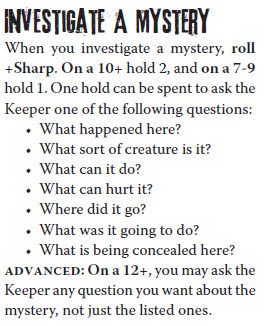
Each move also has an Advanced effect that can trigger if you roll 12+, but you have to have taken one of the Advanced Move options as part of character advancement, which we’ll talk about in a bit.
Harm & Luck
Running around fighting monsters and thwarting evil is dangerous, so sooner or later you’re bound to get hurt. Whenever you take damage, you subtract it from any armor you have and mark the remainder as points of Harm. Once you mark 4 harm, you’re Unstable, and at 7 Harm, you’re Dying! If you take any more Harm, that’s the end for you and your character is dead. Thankfully, there are plenty of ways to heal in MotW through downtime and certain moves across various playbooks.
But what if you REALLY need to avoid taking a hit, or you just fumbled an important roll, that's where Luck comes in. Each character begins with 7 points of Luck. You can spend luck to reduce the harm taken from an attack to 0 or retroactively change the result of a roll to a 12. Here’s the kicker. Your luck is finite and does NOT come back (except in EXTREMELY specific circumstances that shouldn’t be relied on), and once it runs out, you’re Doomed! A Doomed character is at the end of the line and Fate isn’t happy with your existence. The GM, or Keeper, is allowed to make more and more bad stuff happen to you. Results of failure will be worse, monsters will target you more often, any bad, fate-related things in your playbook will begin to happen, and past decision will come back to bite you at the worst time. Doomed characters don’t last long, so don’t let it get to that point if you can help it.
Character Advancement
Ok, so character creation and actual play are pretty straightforward, and that trend continues with your advancement. You gain experience whenever you fail a roll, and once you have 5 experience, you can pick an Improvement from a list in your playbook. These are things like increasing a rating by one, gaining a new move, or taking a move from another playbook entirely. Once you have 5 Improvements, you qualify to take Advanced Improvements. These are even stronger things like gaining 2 Advanced Moves, changing your entire playbook, retiring your character while they still live, or even regaining one of your spent Luck!
Other Stuff
That’s pretty much everything as far as player-facing content goes, but there’s a good bit more for the GM to dig in to. There is advice for creating your own mysteries, stringing mysteries together in arcs, and running downtime and one-shots, an introductory mystery, suggestions for how to customize your game, and a big ol’ list of inspirational material.
Tome of Mysteries and Codex of Worlds
But if you’re looking for more MotW content (official, anyway), Evil Hat published the Tome of Mysteries and, just this last year, the Codex of Worlds. The Tome of Mysteries is just that, a collection of new pre-made mysteries you can run, while the Codex of Worlds is a full-blown expansion with all kinds of fun additions to spice up your game. There are new rules, special team playbooks that the whole group can use, and entire settings to shake up the game, each with their own rules and mysteries! It’s like a 400-page book and a delight to read.
My Thoughts
So, it took me a while to get into playing MotW. It was my first encounter with an RPG that was more narrative focused in its mechanics than D&D and I struggled to wrap my head around it. My friend was running a long-term campaign in it, so I heard a lot of what went on and the kinds of shenanigans the group got up to, and I was curious. Over the years, he ran a couple one-shots, and frankly I didn’t get much out of either. Something about it just didn’t click with me. But this last Halloween, he ran an SCP-themed game using some of the stuff from Codex of Worlds, and that one finally got me. I don’t know if it's because of my love for the SCP universe or that our one-shot quickly became a four-shot, giving us more time together and less pressure to finish in a timely manner, but that game really made me understand it and appreciate it for what it is. And I like what it is.
So, what do I like? Well for starters it's dummy simple, something that has become increasingly important for me over the years. The basic resolution mechanic is clean, the moves are clearly defined, but open-ended enough for creative uses, and because you’re mostly going to be rolling 7-9s it keeps the game interesting. And I could just gush about the playbooks! I think they’re my favorite part of the games, easy. They’re stupid simple to use, are completely self-contained, and have enough options to make a wide variety of characters but not so many options as to be overwhelming. You can hand a brand-new player a playbook, and they can be ready to play in 5 minutes, maybe 10. I wish more RPGs had their classes laid out like this (if you know any, let me know!).
Another great thing about the playbooks is that because they’re so well-structured, it makes it easy for people to make their own custom playbooks. There are quite a few custom playbooks made by fans online, and several of them are actually available on the Evil Hat website!
So yeah, I love this game and if you’re into things like Scooby-Doo, Supernatural, Buffy, The X-Files, or The Dresden Files, I think you’ll have a good time too. Anyway, that's all for now. As always, stay safe, don't forget to love each other, and I'll see you again soon.
#system spotlight#monster of the week#motw#scooby doo#supernatural#the dresden files#buffy the vampire slayer#rpg#evil hat#powered by the apocalypse#mystery#monster#ttrpg#tabletop#tabletop rpg#tabletop games#tabletop roleplaying#the x files
30 notes
·
View notes
Text
My Criticisms For The Released “Missing” Eight Episode
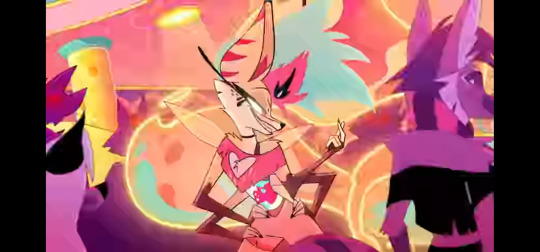
While it was great seeing the episode finally released, it’s no wonder it’s called filler and only partially calls back to the fall out to the previous episode. Like how Bee overflows on empty calories, so does this episode. It also calls into questions things that contradict the worldbuilding.
* While it’s a nice call back to “Die Young” her being partially hellhound really brings up questions as well. Mostly because if the hellhounds are the lowest level of citizens then why is a Demon Lord like her respected.
* Bee-Lzebub in my opinion should have been a total insect instead of a hellhound because of the fact it just makes her look so much generic rather than unique. I know hybrid monster but again Vizie seems obsessed with playing designs too safe. I like her hellhound designs, but I totally think Bee should have been a full insect.
* Also does Vox work for Verosika when he’s dating a Demon Lord. It doesn’t make sense.
* Also if it’s a bad look for a demon noble to sleep with an imp then why isn’t she getting flack for being with a mere hellhound. And in a future episode we will see Asmodeus get in trouble for it.
* Also I noticed in the episode that again a lot of these so-called nobles who are supposed to be enjoying their sinful embodiments are the safe type of edgy. Like Bee is against Blitzo overindulging himself because he’s miserable, instead of fulfillment but if she was a true lord of gluttony she wouldn’t care. And again it’s a product of watering down hell into a magical dimension instead of a place of all out vice.
* There is Loona where the emphasis is the relationship but from the episodes next season so far everything goes back to her being a bitch to Blitzo like nothing was learned and it feels even more pointless.
* And again more of the drama. But at this point it’s expected because the show has strayed far as heck about being an agency hunting down humans for clients.
And again it does seem this episode shows a lot of issues people are having with season 2 which seems to stem from here and it’s probably not going to get much better due to the fact that we are getting so many character episode instead of pertaining to the og premise. It really feels draining and you don’t really connect and just roll your eyes. I do believe by the next episode those criticism will be back in full.
126 notes
·
View notes
Note
no wait please go on more about oscar’s winning mentality… and most of all whether/when you think there will be tension of a fracture with lando because i’m sure it’s inevitable 🤧
hi anon!!! :') haha okay well this might be an annoying hot take but the reality is that i don't think there's such thing as a "winning mentality" in the first place T__T or idk how you meant it (and of course please feel free to elaborate if you'd like!) so i apologize sincerely if i'm completely misinterpreting your question, but for me personally what i appreciate from oscar is rather certain qualities he possesses / has been said to possess that i believe put him in a favorable position to better attain an optimized performance threshold, if that makes sense, which maybe sounds pedantic and many would argue is essentially a winning mentality but i still try to be careful with how much i correlate driver intangibles with outcome-based hypotheticals because i find that many fans + journos + team personnel alike can be eager to perpetuate an ideal of a "mentality monster" or "a future wdc" as though either construct is delineated by the same universal qualities when imo that simply could not be further from the truth…
…i've started and deleted like 5 paragraphs about car/driver/team development & the service ecosystem of professional sporting industries & human tendency toward recency bias and arbitrary pattern recognition but much of this is most likely not relevant to your question at all so let me try to be a bit more brief LOL.
the short of it is: motorsport and f1 in particular are interesting because all professional sports are entertainment products that rely on human unpredictability, but the level of agency its primary actors are privy to and the degree to which certain intangibles (e.g., mentality, drive, Wanting It, Dawg/60 as i say when talking about hockey, and in some sports even individual marketability) are upheld as competitive instruments vary widely per the nature, construction, contact level, global reach, etc. of each sport. with f1 the "front-stage" end product is of course the race package media companies are contracted to present to a global audience, but its primary actors (drivers) occupy a unique position in that they are both the vehicle facilitating that product but also occupiers of another, both figurative and literal, Vehicle that is in itself its own end product, only designed and manufactured in a back-stage black box. and so most of the time in sports, the entertainment is not only the product itself but also the discussion generated around the product, which is then enhanced by the exchange of external data and anecdote, but the problem with f1 is that this sort of end-product inception and the inherent secrecy of car development makes for third-party analysis of the sport that is equally complex and limiting… as in, f1 fans are constantly being inundated with soooo so much data because it's literally a sport built on relative numbers, but all of that data is pretty much useless without proper contextualization—sure, you can look at public telemetry all you want, but you can't really present an informed conclusion on certain approaches or styles or deficits unless you also identify nuances of both the car's inherent characteristics and its specific set-up during the session. which is also how i feel about evaluating driver mentality!!!
basically i think there's no such thing as a meaningful "winner's mentality" at the top level of any sport because everyone wants to win, inherently, and without this ambition you wouldn't be in f1 to begin with. i also think the adjacent idea of a mentality uniquely crafted to becoming a winner is in itself a vague concept for f1 because there's less of a binary quality to performance than compared to other true team sports (yes you technically lose every race you don't win, but it doesn't explicitly count against your season record). in this case i'll define it as becoming f1 wdc… which of course we all know is contingent much less on driver influence than on team direction and development, and again is why i dislike the practice of saying x or y is "wdc material" because that's a very meaningless metric at the end of the day.
god okay i know i never shut up about andrea (SORRY AGAIN.) but personally i really love the way he talks about oscar because i think he understands this relativity very well, and that a driver should develop specific, identifiable, and objective actions in order to support the optimization of their processes (and thus performance!) rather than to achieve any specific outcome (winning). that is to say… i guess honestly, my idea of a "winning mentality" is simply not having a marked preoccupation with winning in the first place, because what matters most is being able to consolidate the right now of what you can control in order to support the later of what you will achieve, and letting the results speak for themselves instead of getting caught up in the idea of needing to or wanting to win (when that should already be a given). which i do think oscar embodies! some astella quotes:
“I don't look how far we can go. I just look [at] what do we have to do now to go as far as possible?" (qatar press con)
"For me what is important is just a sense of journey. The results take care of themselves, so what you really have to focus on is, every day, try to be better than yesterday." (speedcafe)
"I'm not one that works by targets or expectations. I really work by process, by identifying what's the right approach, what's the right vision, and then let results come to you. [...] Let's not think about the results. Let's just think about ‘how do we deliver performance projects in this many areas of the car, such that we can be innovative, such that we can be fast in developing, but also developing at a pace that is sustainable over time?'" (btg)
My God… That's Oscar Piastri's Music!!! anyway i guess what i'm trying to say is that i don't really think there is any true characteristic a world champion must have because it is less about the characteristic itself and more about how it interacts with other characteristics and the way a person manages this sum total—take the idea of "consistency" for example, which is often liberally applied to drivers without any temporal/material granularity. do we mean over an entire career or a season or during a single race length? do we mean consistency in terms of race craft or qualifying pace or a specific metric like race starts and reaction time? being consistent is good if it means that you're consistently getting high positions relative to your competitors, but it can also veer into an overly conservative approach. so to me everything requires a very finetuned balance of raw pace, consistency, adaptability, and a healthy capacity for self-reflection, and it's why i really liked the way andrea talked about how oscar had natural speed as a rookie but also took this incremental approach to his weekends by working toward his maximum session over session, because pushing the limits in fp1 is useless if you're still navigating and identifying new areas of opportunity. but of course this then also relates back to the timeline of adaptability and how everything in motorsport is = the faster you can "adapt" (within a weekend but also over the course of a season) the higher your stock is, so this gradualism must also be well-managed. and the thing is that a driver's capacity to adapt as they move onto newer categories and face new technical regulations is something we as outside observers cannot truly predict or project even though we all love to try!!!
there is a whole spiel about defining what adaptability even means in motorsport here but i'll spare everyone. i think it's very fair to say that oscar is a generally adaptable driver (in that he can get up to speed with the technical components of a new car quickly, that every championship he won in his junior career was in a new chassis, that he has an ingrained "awareness of what the opportunities are" when driving and the "capacity to self-recognize where there is more to come from either himself or from the car," and he so far has shown marked improvements over the length of a race weekend that reflect positively relative to rookie expectation), and it can be assumed that his most pronounced weakness from 2023 will be much better mitigated now that he has crucial track experience in hand, since tyre degradation is expressly something simulator work cannot fully prepare you for. but at the same time i really reject any notion that ~now that he's not a rookie + because he's an adaptable driver + his mentality is sooo much better than lando's (when again it is about the Sum Total of characteristics and not how one specific characteristic is reflected in previous wdcs) his pace will immediately match/challenge lando's~ because first of all, no, and second of all the quantitative mystery is still, how much of that race-pace deficit can better management annul for oscar (or conversely how much of it is simply inherent to him)? so there are too many variables… and anyone who tells you they can predict that is lying!
also re: Potential 814 friction…!!!!!! i guess again as i always say there are really too many variables to make assumptions here... and i think it's hard to imagine, actionably, what a fracture would even look like for them, since lando and oscar are both people who manage the on/off-track separation well and i honestly don't really foresee any huge professional fallouts even if they do have to fight for positions on-track more frequently. but like andrea said, if oscar wins before lando then it means (unless it's a truly fugazi win lol) that mclaren has a car capable of winning, and i again reject this idea that lando is so mentally weak that he isn't capable of being motivated by that, and equally it is actually a Good Thing for a team to have "two #1 drivers" so long as that relationship is well-managed... will they even have two #1 drivers next season (i.e. will oscar really be that much closer to lando)? and if so will it be well-managed? that i cannot tell you!!!!!
honestly teammate dynamics are not something i'm ever confident in extrapolating much from because there are so many contingencies to Who wins first / does anyone even win at all (X to doubt) / who outperforms whom (and how do we measure that) / who "leaves more on the table"... all of that stuff......... but it is definitely a very interesting question. and i will be eager to witness how their relationship develops based on the mcl38's performance next season and of course its performance relative to rb/merc/fer!!!
#ask#i'm sorry anon this is probably not what you asked i feel like i do not know how to give normal answers T__T i have annoying pedant disease
18 notes
·
View notes
Note
Thoughts on Chiron in synastry?
I actually just read the book 'Chiron in Love: The Astrology of Envy, Rage, Compassion and Wisdom' (2023) by Liz Greene, and I would really recommend it to anyone who wants to do a deep dive on Chiron in synastry! The book is based on a seminar she originally gave in 2005 and it goes over 'the nature of Chiron', 'Chiron in synastry', 'Chiron in the family,' and 'Chiron in the composite chart'. I don't think I could possibly explain anything from this book better than Liz Greene herself, so the majority of this post will be made up of excerpts (some of the quotes are very long so bear with me). And unfortunately there's a word limit on tumblr so I'll have to split this into multiple posts. This post will be focusing on Chiron alone, and the next post will delve into Chiron in synastry.
In order to understand Chiron in synastry, it's important to first develop a clear understanding of Chiron on its own. In this book, Liz Greene begins by giving some background to the myth of Chiron, "The story that astrologers tend to relate to Chiron is his wounding by Herakles' poisoned arrow. But the way it's usually presented today in [astrological] circles is significantly different from older versions of the story. According to the updated version, Chiron is wounded and then becomes a healer because he has experienced deep suffering and develops compassion. I'm not suggesting that this idea is 'untrue', as it's a powerful theme connected with the emergence of genuine empathy and the capacity to turn one's suffering into a creative tool to relate to and alleviate others' pain. Chiron is a potent image of the healer who has acquired wisdom through personal pain. This version of Chiron has learned how to heal others because he has been wounded, and he reflects the process by which life's damage can enhance consciousness and put us on a path connecting us with [deeper] realities. The fact that Chiron can't heal himself is a necessary part of the story. If we could fully heal our own wounds, we might [lose] our compassion for others who are suffering. It's only the ongoing recognition of our frailty and damage that allows the continuance of empathy. There is profound truth in this interpretation. The only problem is that the idea of healing gifts emerging as a product of wounding is not what the myth of Chiron as it has come down to us from antiquity actually tells us. There are [many] sources for myths, and they inevitably mutate over time according to changing cultural contexts...I'm not suggesting that only the earliest rendition of a mythic story is the 'right' one. Myths are living entities and, because they are symbolic, many meanings may be simultaneously 'right', and different readings of a story may be especially applicable at different epochs of history. But when we're seeking astrological insights, it's always worth looking at versions of the story different to the ones we're most attached to, because they can offer us a new perspective on the pattern." (Greene, pp. 28-31)
She then goes on to describe the original myth of Chiron, "Whatever version of the story we consider, the most striking difference between the one given in ancient sources and the one told in contemporary astrological circles is that in earlier sources, Chiron doesn't become a healer because he's wounded. He's already a healer, and his wounding not only puts an end to his career but also results in the relinquishing of his immortality. There seems to be agreement about the fact that the wounding occurs accidentally through the agency of Herakles; the [superhero] of Greek myth who is given 12 Labours to perform as a penance for the inadvertent murder of his wife and children, and manages [to complete all of them]. Herakles had just finished the second of his 12 Labours; the fight with the Lernaen Hydra, a poisonous snakelike monster with nine self-regenerating heads. All the hero's spent arrows were covered in the Hydra's deadly blood. After he put the arrows back in their quiver, he set off to visit his friend Pholos, the wisest and most benign of the wild centaurs. Pholos had a sealed jar of wine hidden in his cave which he had vowed to never touch because he knew that wine could drive centaurs mad. Pholos [was] determined to be civilised and loyal to his vow. Despite Herakles' insistence, he refused to open the jar of wine. But Herakles, being somewhat pushy, finally bullied Pholos into opening the wine. The other centaurs [caught a whiff of it]. They went mad from the mere scent of it, seized the jar, and started drinking. They began to tear up trees and smash boulders and hurl rocks, shooting arrows at each other and also at Herakles. Chiron, their King, rushed out of his own cave to stop the madness, because these were his people and he was responsible for them. Herakles meanwhile was pulling arrows out of his quiver and shooting them in every direction, killing many of the centaurs. In the midst of [this chaos], an arrow passed through the arm of one of the centaurs and accidentally struck Chiron. The arrow lodged in Chiron's hip, knee, foot/hoof (depending on which myth you read), all three of which belong to the horse part of him. Because the arrow was coated in the Hydra's [poisonous] blood, the wound it inflicted couldn't be healed. Chiron rushed back into his cave howling in agony. No matter what remedy he tried, his skills couldn't heal the injury. Because he was immortal, he couldn't die the way the other centaurs did. His situation was impossible and tragic. He couldn't function because of his agony, so he lay in his cave screaming in pain. Then a divine intervention occurred. The Titan Prometheus, who had offended Zeus by stealing the god's fire to give to humans, had been punished by being chained to a rock in the Caucasus mountains, where Zeus's eagle visited every day to devour Prometheus' liver. But this torture didn't quite kill the Titan because every night the liver miraculously regenerated and heralded another day of agony. Zeus, displaying his most spiteful face, decreed that this misery had to go on until some divine being was willing to surrender the gift of immortality to Prometheus. There had been no volunteers. Herakles, who felt guilty because Chiron was his friend, said to his father Zeus, 'I know someone who might be willing to do it.' Thus Chiron relinquished his immortality to take the place of Prometheus in the underworld, freeing the Titan from suffering and at the same time freeing himself from his own pain. Before his wounding, Chiron was already a healer and teacher, good and wise, gifted and kind. But through no fault of his own, he is caught in the [crossfire]. He blunders into the middle of the conflict to stop it, but [is not able to]. He can do nothing to heal himself despite all his wisdom and all his arts, because the Hydra's poison is an eternal poison." (Greene, pp. 31-34)
In this myth Chiron is faced with an impossible situation, one that he isn't personally responsible for, "Chiron can't keep his immortality without eternal misery and wretchedness and the loss of his purpose in the world. He can't remain a god. He isn't to blame, and his blamelessness seems to be one of the major themes of the astrological Chiron." (Greene, p. 35) In your natal chart, Chiron can point to an area of life where you feel unfairly and irrevocably wounded, and perpetually unable to soothe the pain of this wound. It's where you feel you are "[a] victim of life]" (Greene, p. 36), as Liz Greene puts it, being arbitrarily subjected to pain and suffering by something much larger than yourself, something completely outside of your control and beyond your capabilities as an individual.
She adds, "It's only when Chiron is ready to relinquish his immortality that he is granted release from his suffering. This is a disturbing denoument, and it's understandable that is has been reinterpreted so that Chiron's wounding results in compassion and healing gifts. But I think it's important to explore the myth in its original form as well as acknowledging the value of the latter version, rather than trying to convince ourselves that there will always be a happy ending to this story...The myth tells us that Chiron's wound can never be cured. But perhaps we can try to transform our way of responding to it and turn it into something more [creative and life-affirming]. That effort might itself constitute healing." (Greene, pp. 35-41) She then discusses what it might mean to 'relinquish immortality'. "Audience: I think the relinquishment of immortality means a kind of humility in life, and an acceptance of your own death. Liz: Yes, I agree. The sacrifice suggests an acceptance of life's imperfections, the limits of our power as individuals, and our inevitable mortality..." (Greene, p. 47) There may be no 'cure' to Chiron's wound, but through adjusting our perception and reaction to this wound, and through profound acceptance, we can slowly begin to heal.
I'll end this post with an analogy from the book about how different things in life can be viewed through different lenses, or planets that is, and I think it really helps demonstrate how Chiron actually feels in a chart. She says, "Think about your last trip to the dentist. If you view the experience through Saturn's lens, it's an uncomfortable but necessary part of keeping your body healthy. It's unpleasant but you put up with it stoically and leave the dental surgery quite pleased because you've discharged your duty to your oral hygiene for another year. And if you have to lose a tooth or be fitted with a denture, well, that's just the hard reality of life. Viewed through Venus' lens, the important issue is having a beautiful smile, and it's worth putting up with just about anything and paying any amount of money to achieve it. And it's even more rewarding if you fancy the dentist. But viewed through Chiron's lens, it's a terrifying experience because of the expectation of suffering. You'll put off the visit for as long as possible, and the delay may worsen the condition of your teeth. The hygienist becomes a sociopathic sadist and the dentist transforms into the slasher from A Nightmare on Elm Street. If you must have a tooth extracted, it confirms your conviction that life is brutally unfair, because surely they could have saved the tooth had they cared about you enough or if you could have afforded a top-quality private dental clinic. You leave the dental surgery feeling as though you're suffering from PTSD because it was so traumatic. We can bring many different archetypal perceptions to our experience of injury. When we bring Chiron's perception to it, the experience carries all of the connotations of Chiron's myth." (Greene, p. 68)
In the next post we'll put all of this into the context of synastry.
Greene, L. (2023) Chiron In Love: The Astrology of Envy, Rage, Compassion and Wisdom. Swanage: The Wessex Astrologer Ltd.
35 notes
·
View notes
Text
OC'S as obscure references
Tagged by the incomparable @astarionposting, thanks for the tag and the excuse to talk about my current OC, lovely ♡
You can find a link to her post here!
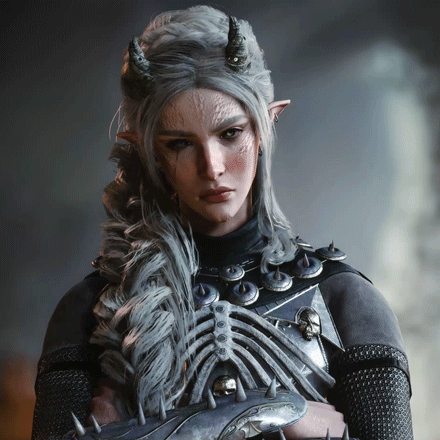
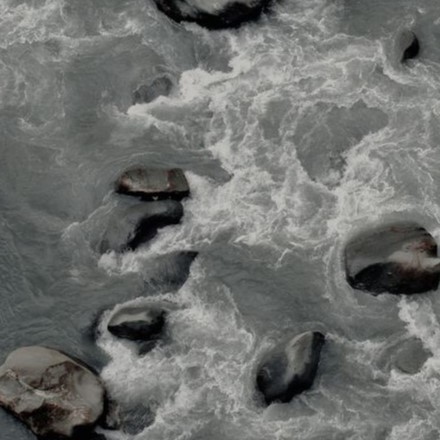
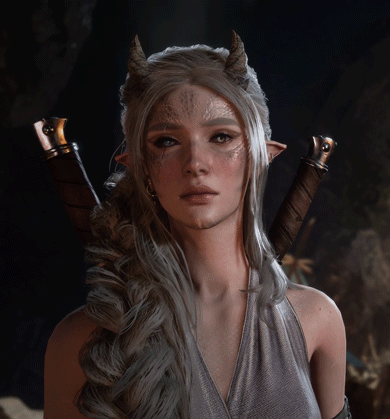

COLOURS: antique pewter, champagne, nacre, seashell pink, stone gray, jade sea glass and pale driftwood (color palette here)
NUMBER: 7
MONTH: june
GEMSTONES: pearl and kunzite
ASTROLOGICAL SIGN: cancer
MYTHOLOGICAL CREATURE: shén (clam monster)
ANIMAL: cyerce elegans (oooohhh shiny sea slug)
SEASON: the start of summer
CELESTIAL BODY: hyperion (saturn vii)
MAGICAL POWER: disintegrate
WEAPONS: twin scimitars, short bow, and her silver tongue (this bitch is a LIAR!! a DECEIVER!!!)
TIME OF DAY: dawn, just as day breaks. the air is thick and balmy as the nights coolness dissipates; it’s almost uncomfortable- how your clothes stick to your skin- but it's quiet, serene even, the birds have yet to start chirping. there’s not a soul around, and the new day is yours.
WEATHER: summer storms- a sun shower, humidity with heat lightning
SKY: when the sun starts to break though the clouds after a heavy rain
ELEMENT: water
PLACES: open water, mangroves, river mouths, and marshlands
PLANTS: white wisteria, sacred datura, river reeds, and sambucus nigra
SCENTS: ginger, magnolia, ambergris, serenolide, galbanum, iso e super and sea salt
SEASONINGS: white pepper, sage, tarragon, white vinegar, kombu
FOODS: naengmyeon (sour cold noodles)
DRINKS: iced lemon balm tea
CANDY: dark chocolate with candied orange and cranberry
SONGS: playlist (not a mobile friendly link!! WIP, if there's any links that lead to nowhere or unfinished javascript pages... shhh)
ART STYLE: Impressionism
PIECE OF STATIONARY: a half-filled journal long forgotten in a drawer
METHOD OF LONG DISTANCE TRAVEL: walking, she's a regular nancy sinatra
SOCIAL MEDIA: naenia does not know what myspace is.
MAKEUP PRODUCT: plum metallic eyeliner and a glossy lip, if it’s iridescent or shiny she wants it
THREE EMOJIS:🌊🌄⚔️
FEAR: having a lack of self-agency or free will, betrayal, hurting her nearest and dearest
peek-a-boo i tag you: @phasebun, @hellcairn, @zyana-wyvern and @dark-and-kawaii (plz don't feel obligated to do this and if you already have link me your post!!! i wanna see!!! also, if I didn't tag you but you still wanna participate- please do!!!)
15 notes
·
View notes
Text

Greetings 👋! We’re The Monster’s Playbook, a monster-hunting actual play podcast set in Minneapolis, MN. We use the Monster of the Week game system by Evil Hat Productions.
We may be new to Tumblr, but we’re not new to actual plays! We’ve been doing this podcast for about a year now and have been playing our current campaign for even longer. And that means there’s plenty of content to sink your teeth into.
OUR CAST OF CHARACTERS INCLUDES:
Theo Nessos 🧙♀️: a professional sorceress trying to escape the shadow of her powerful magical family.
Mark Clayton 👻: a pretty haunted introvert, who just wants to make sense of his powers and the weird stuff that keeps happening to him.
Kira Ashwood 📓: a journalist with a cult past she’s desperate to atone for, and a secret power hidden even from herself.
Casey Davis 🔫: a taciturn secret agent becoming disillusioned with the agency she thought she could trust.
GET STARTED WITH OUR SHOW!
As I mentioned, we've been playing our campaign for awhile now, so we start our show "in medias res". We recommend you get started with our Session 0 (below) and Season 1 recap episodes to get up to speed.
If you like Buffy the Vampire Slayer, The Dresden Files, or any city-set supernatural story with monstrous threats and messy feelings then come check us out! We’ve got a new episode every other Tuesday on Apple Podcasts, Spotify, and your other usual suspects.
Podcast art by the wonderful @carlzsays.
#actual play#monster of the week#pbta#indie ttrpg#actual play podcast#ttrpg community#ttrpg podcast#motw#motw podcast#evil hat productions#motw rpg#ttrpg#Spotify
110 notes
·
View notes